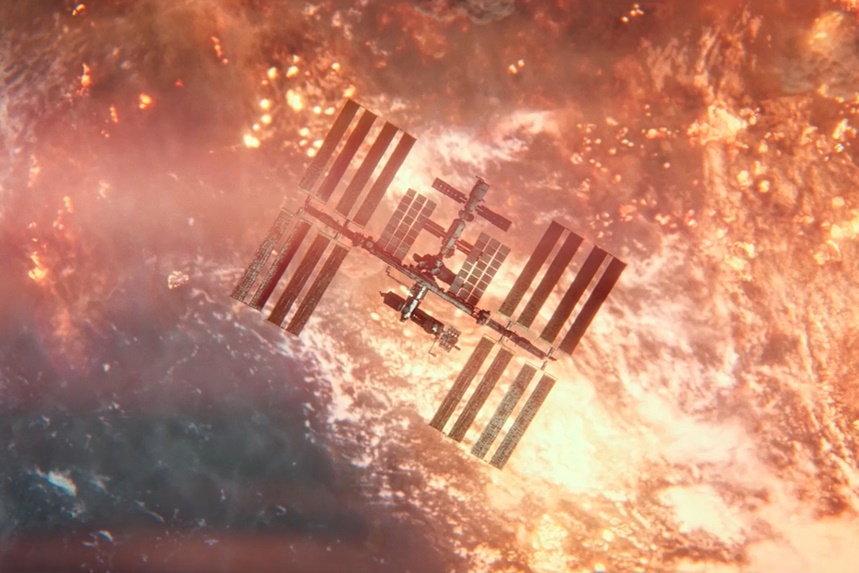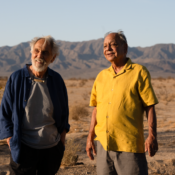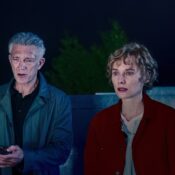I.S.S.
⭐️ ⭐️ ⭐️ ⭐️
Rating: R
Run Time: 1 hour 35 minutes
Stars: Ariana DeBose, Chris Messina, Masha Mashkova, Pilou Asbæk
Writer: Nick Shafir
Director: Gabriela Cowperthwaite
A nifty, fast-paced thriller with a 21st century twist, I.S.S. asks the question: “If two countries can’t get along when they’ve got a whole planet to share, what happens when you squeeze them into a flying school bus?”
The Answer: First they lie to each other about being above politics (literally and figuratively); then, when the atomic bombs start flying below, they take their cues from the proverbial scorpions in a shoebox.
Oscar winner Ariana DeBose (West Side Story) stars as Dr. Kira Foster, an American scientist who’s arriving aboard the International Space Station (I.S.S.) to carry out a months-long experiment with white lab rats. She’s the newbie in the crew of six – half U.S. and half Russian – and is immediately struck by the tight bonds of friendship these disparate people enjoy, despite the unspoken tensions between their two countries.
“We’re scientists,” Russian crewwoman Weronika (Masha Mashkova) tells her. “We’re an evolved species.”
And that seems to be true as the international colleagues cooperate through their daily routines, stopping for the occasional vodka toast or karaoke session. Yep, there’s a sobering episode when Kira’s rats, disoriented by zero gravity, start eating each other, but these are scientists we’re talking about, not literary scholars looking for examples of foreshadowing.
Soon after Kira’s arrival, things heat up considerably — especially down on Earth, where the surface begins exploding in fireballs as Russia and the U.S. let loose their nuclear arsenals on each other.
Communication with home is cut off, except for one encrypted message, sent to each I.S.S. team by their respective governments: The Space Station is the new high ground. Take control “by any means necessary.”
You might think that these ambassadors of peace, masters of science, and representatives of an “evolved species” might sit down and discuss their dilemma before they start stalking and killing each other. But director Gabriela Cowperthwaite and first-time screenwriter Nick Shafir instead lurch past any such boring transitions and order their characters, after what seems like 30 seconds of reflection, to flip the switch from sober scientists to boxcutter-wielding assassins.
It’s probably for the best: What we’re here for is not a meditation on human relations but a slam-bang thriller where it’s almost impossible to keep your would-be killer at arm’s length; a white-knuckle space adventure where the monsters aren’t on the outside trying to get in, but instead floating in your face.
On the subject of floating, Cowperthwaite, BAFTA-nominated for her 2013 orca documentary Blackfish, enlists the weightlessness of space to make I.S.S. a supremely immersive, if claustrophobic, film experience. Her camera bobs and weaves through the craft’s narrow portals; the crew members float convincingly at their posts. When things go sideways, and one crew member or another frantically tries to push through the corridors, grabbing at whatever handhold they can, weightlessness morphs from being a space age wonder to a deadly inconvenience.
Shafir’s script does offer some nice twists: The two national fronts show some cracks after a while, and a romance offers a wrinkle or two. The cast is uniformly excellent: DeBose, especially, brings smart resourcefulness to a woman whose idea of conflict was previously a race for research funding. I happen to have spent time with a number of astronauts over the years, and Chris Messina nicely embodies the cool demeanor and slightly elevated ego the profession seems to require.
As for the Russian side, costar Pilou Asbæk, in particular, seems to favor that slightly thuggish persona filmmakers like to assign to Russian characters. Of all the crew members, his is the one that slips most easily from a jolly tovarisch to a total maniac, as if he’d been planted there by Russia’s warlords, a notion that seems a tad too convenient.
Still, I suppose, it takes all types to crew a space station. I.S.S. will keep you guessing — and gasping — over which type will eventually prevail in the most cramped battlefield imaginable.
When it comes to global conflict, I.S.S. reminds us there is nowhere to hide.
Become a Saturday Evening Post member and enjoy unlimited access. Subscribe now



